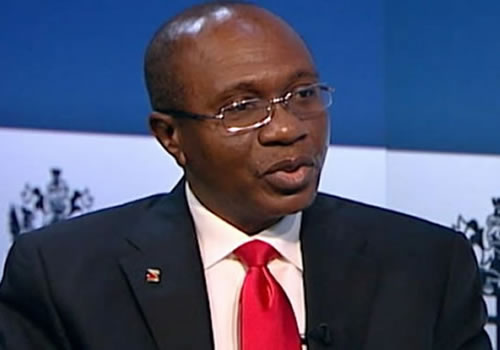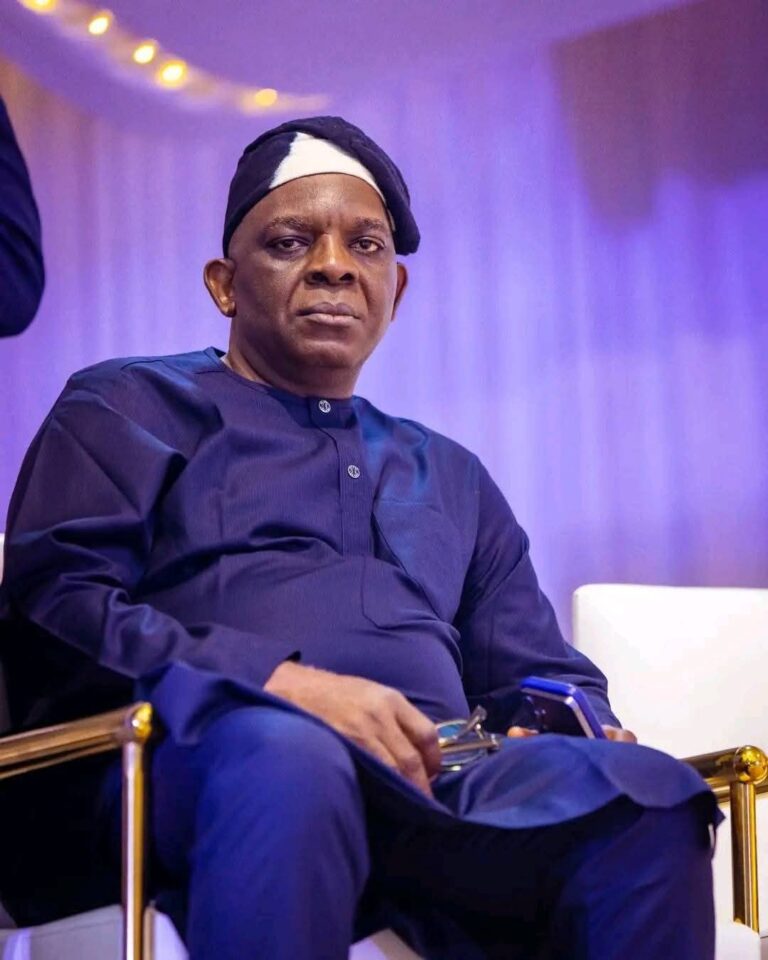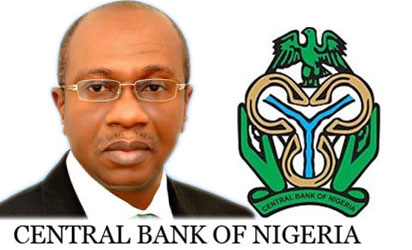News
CBN lists FX gains restriction on 41 Items …projects foreign reserve to hit $40bn

The Governor, Central Bank of Nigeria (CBN), Mr. Godwin Emefiele
By Joseph INOKOTONG
The Governor, Central Bank of Nigeria (CBN), Mr. Godwin Emefiele says the dogged implementation of the Bank’s policy, which restricts importers of certain items access to foreign exchange from the Nigerian Forex market, has led to improvements in the domestic production of those items and a reduction in Nigeria’s import bill.
Mr. Emefiele said this while delivering the 2017 Annual Bankers’ Dinner of the Chartered Institute of Bankers of Nigeria (CIBN) in Lagos at the weekend.
Specifically, he noted that, “barring any unforeseen shocks, Inflationary pressure will continue to ease”, expressing optimism that “the rate may return to very low double digit or high single digit levels during the next year”.
He also expressed hope that “the foreign exchange reserve will continue to grow”; stressing that “Nigeria can attain a foreign reserve position of about US$40 billion by end of 2018”.
He asserted that local manufacturers were recording profits and major boosts to their revenue due to the policy.
According to him, in spite of opposition to the introduction of the policy restricting 41 items from Nigeria’s foreign exchange market, the faithful implementation of the policy had seen to the considerable decline in Nigeria’s import bills.
He disclosed that “from an average of about US$5.5 billion, the nation’s monthly import bill had fallen consistently to US$2.1 billion in 2016 and US$1.9 billion by half year 2017.
Citing the example of Psaltry International Limited (PIL), an agro-allied company based in Oyo State, he said the introduction of the policy had reversed the fortunes of the starch-producing company.
The CBN Governor noted that prior to the policy, Psaltry had only few customers and a huge backlog of inventory.
However, due to the policy, he disclosed that the company now has over 50 multinational clients including Nestle and Unilever, thereby saving the country $7 million in foreign exchange drawdown over the two years of the policy.
While also asserting that the access restriction policy had freed Nigeria from the perennially embarrassing importation of toothpicks, the CBN Governor disclosed to the delight of the audience that as part of the gains from the policy and in line with an agreement reached with Unilever, which moved its production facility to another country a few years ago, the company had agreed to commission a new Blue Band Factory in Agbara, Ogun State before the end of 2017.
Mr. Emefiele further disclosed that the implementation of the policy had a great impact on Nigeria’s import bill and boosted local rice production in Nigeria.
He recalled that Nigeria, in 2012, imported about 1.2 million metric tonnes of rice from a trading partner, noting that, in 2016, after one full year of implementation of the policy, rice exports to Nigeria had fallen by 99 percent to only 784 metric tonnes.
“These are clearly verifiable successes of government’s attempts to create jobs locally, improve the wealth of our rural population, improve industrial capacities and ultimately attain economic growth in Nigeria,” he noted.
On the current position of the economy, Mr. Emefiele expressed delight that the Nigerian economy had recorded positive growth after five consecutive quarters of negative growth, thereby signaling its exit from recession.
He also noted the downward trend in headline inflation from 18.72 per cent in January 2017 to the September 2017 figure of 15.98.
The CBN Governor equally expressed gladness that the Naira had appreciated from over N500/US$1 to about N360/US$1.
While noting that the economy had seen stability in the exchange rate of the naira for over six months, he affirmed that the exchange rate was not only stable, but was also converging across various windows and segments of the market.
He noted that since the establishment of the Import and Export Window, the CBN had recorded about US$10 billion in autonomous inflows through this window alone.
According to him, this reflected the effect of the increased transparency which that window accorded the foreign exchange market and its impact of improving investor confidence and business sentiments.
Speaking on the country’s reserves, Emefiele noted that the reserves had recovered significantly from about US$23 billion in October 2016 to over US$34.3 billion as at November 3, 2017.
“The accretion in reserves does not only reflect increased inflow but also our shrewd FX demand management strategy,” he added
In assessing the country’s rating on the ease of doing business, he disclosed that the World Bank’s ease of doing business indicator for 2018 showed that Nigeria, with a score of 52.03, improved 24 places to rank 145 out of 190, standing above the regional
average score of 50.43 recorded for sub-Saharan Africa. This is even as he noted that the Bank’s effort had reinforced the Presidential initiatives to improve ease of doing business in Nigeria.
Speaking on the economic outlook for 2018, Emefiele warned fiscal and monetary authorities against complacency and over-confidence because of current positive developments in the economy. Rather, he urged all to strive to improve and sustain the pace of recovery.
Although he noted that the import bill had dropped, he stressed that Nigeria’s manufacturing and agriculture sectors still had a long way to go if the country were to attain self-sufficiency in those sectors.
Nevertheless, he assured that the CBN, on its part, would continue to fine-tune its policies and strategies based on its understanding of evolving developments and supported by in-house technical analysis and simulations.
He assured that the CBN would remain proactive in ensuring that the welfare of Nigerians is optimised at any point in time.
Mr. Emefiele also expressed hope that the economic recovery would consolidate and that the exchange rate stability currently being witnessed would continue.
While expressing hope for even stronger policy coordination, collaboration and cooperation in 2018, he hinted that monetary policy stance could change when the underlying fundamentals become supportive.
The CBN Governor expressed delight that some of the pains that were associated with some of the CBN’s policies had become major gains in Nigeria’s economy, and urged all stakeholders to work towards creating a Nigeria, where balanced growth and shared prosperity is guaranteed for all.
News
Pius Akutah’s Alleged Fraud at Nigerian Shippers Council Uncovered

Investigations by Nigerian Concord Newspaper reveal that the Executive Secretary of the Nigerian Shippers Council, Mr. Pius Akutah, has allegedly misappropriated public funds for a lavish lifestyle.
According to our findings, within months of assuming office, Akutah allegedly purchased a bulletproof SUV valued at approximately N850 million. In addition, he is reported to have acquired over twenty exotic SUVs for use as a convoy.
Akutah is also said to have acquired multiple high-value properties, including three in Abuja’s Maitama and Asokoro districts worth over N2 billion, and two in Lagos’ Banana Island valued at N1.8 billion. These acquisitions appear far beyond the scope of his official salary and allowances.
Further investigation suggests that Akutah may be using public funds to support political ambitions, including allegedly grooming militants across 23 local government areas in Benue State for a potential 2027 gubernatorial bid.
Staff of the Shippers Council reportedly claim that Akutah frequently accesses the council’s treasury without proper authorization. Some insiders have indicated that a petition will soon be filed with the EFCC, ICPC, and the Presidency to report his alleged misconduct.
*
News
Pius Akutah’s Alleged Fraud at Nigerian Shippers Council Uncovered

Investigations by Nigerian Concord Newspaper reveal that the Executive Secretary of the Nigerian Shippers Council, Mr. Pius Akutah, has allegedly misappropriated public funds for a lavish lifestyle.
According to our findings, within months of assuming office, Akutah allegedly purchased a bulletproof SUV valued at approximately N850 million. In addition, he is reported to have acquired over twenty exotic SUVs for use as a convoy.
Akutah is also said to have acquired multiple high-value properties, including three in Abuja’s Maitama and Asokoro districts worth over N2 billion, and two in Lagos’ Banana Island valued at N1.8 billion. These acquisitions appear far beyond the scope of his official salary and allowances.
Further investigation suggests that Akutah may be using public funds to support political ambitions, including allegedly grooming militants across 23 local government areas in Benue State for a potential 2027 gubernatorial bid.
Staff of the Shippers Council reportedly claim that Akutah frequently accesses the council’s treasury without proper authorization. Some insiders have indicated that a petition will soon be filed with the EFCC, ICPC, and the Presidency to report his alleged misconduct.
*
News
Special Birthday Wishes to Zege Mule U Tiv & Wazirin Adamawa

I am writing to felicitate with Your Excellency, Atku Abubakar, GCON, former Vice-President of Nigeria (Zege Mule u Tiv & Wazirin Adamawa)
on the occasion of your 79th birthday anniversary.
I join your teeming admirers globally in celebrating you on this special day, an adorable Statesman and my Boss.
I recall with nostalgia, how countless generations have benefited from your generosity, wealth of experience and benevolence including being my key benefactor even as a young lawyer for my professional success.
Your Excellency, may your special day be filled with grandeur befitting your illustrious career.
I wish you continued success, prosperity, and an unending stream of accolades.
It takes a remarkable kind of fortitude to remain active in public life well into one’s golden years. Your dedication and patriotism remain truly exceptional.
May you enjoy a day of reflection on your many years of fruitful service to humanity. It is my prayer that God Almighty grants you many more healthy, fruitful, and fulfilling years ahead, and continues to endow you with wisdom, strength, and the grace to keep contributing to our nation-building.
Happy Birthday, Your Excellency.
Michael Kaase Aondoakaa SAN.
Former Attorney General of the Federation and Minister of Justice
-

 Uncategorized5 years ago
Uncategorized5 years agoFG, states urged to harness flooding for ranching, others with technology – Agbaje
-

 Headlines10 years ago
Headlines10 years agoBreaking: EFCC seals Borno House of Assembly, as Hon members take to their heels
-

 News11 years ago
News11 years agoNigeria Security Operatives Stage Manhunt For Homosexual Perpetrator
-

 News9 years ago
News9 years agoHow 21-year-old Girl fled community over accusation of lesbianism
-

 News10 years ago
News10 years agoYobe Gov Moves Against Deputy
-

 Opinion7 years ago
Opinion7 years ago7 signs she has friend zoned you
-
Technology4 years ago
Online job placement company headhunts women
-

 Headlines10 years ago
Headlines10 years agoBorno Dep Gov Abducts Another Church Leader






